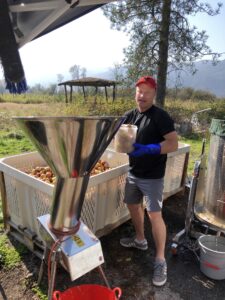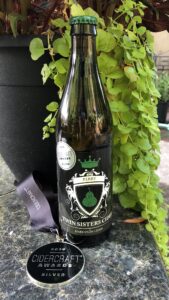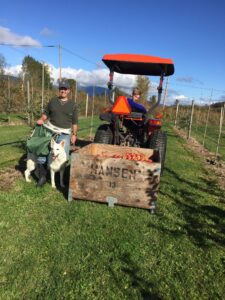When he was a boy, Jeff Peterson, MD, fondly remembers that he would help his dad pick blackberries and watch intently as the berries were transformed into wine.
“I liked it when my dad offered me a sip because the wine tasted very sweet,” Dr. Peterson says. “It was a special family moment.”
These days, Dr. Peterson, a rheumatologist with the Western Washington Medical Group, Bothell, president of the Washington Rheumatology Alliance, and a clinical associate professor of medicine at the University of Washington, Seattle, has earned a reputation for his own work as a cidermaker.
Typically made from apples, cider can also be made from other fruits. When cider is made with pears, it’s called perry. Unlike beer, which is brewed, cider is fermented using a process similar to winemaking.
From Terrible to Tasty
Dr. Peterson’s first attempts at making alcoholic beverages began when he was a medical student at the University of Washington.
“A friend was growing grapes in their backyard, and I decided to try making wine,” Dr. Peterson says. “I remember throwing them in the bathtub to crush and thinking I could easily make wine [after] the years I spent watching my dad, but the first batch was terrible.”
Several years later, while completing his fellowship in rheumatology at the University of Washington, Dr. Peterson tried making the blackberry wine he remembered from childhood. With each batch, he noticed an improvement.
After he and his wife, Jennifer, bought a 34-acre horse farm east of Bellingham, Wash., Dr. Peterson got serious about making cider. He planted cider apple trees and took a course in cider and perry production at Washington State University to hone his craft.

Dr. Peterson spends weekends on his farm pressing apples and starting the fermenting process for cider.
“I installed trellises and a crop system and began growing apples, [with] varieties including Brown Snout, a bittersweet variety, and Kingston Black, which is bitter-sharp,” Dr. Peterson says. “The key to making a great cider is to find the right blend of apple, or pear, juice and balance the sweetness and tartness with the alcohol content.”
In 2017, Dr. Peterson launched his own company, Twin Sisters Cider, featuring several unique ciders, including Cider Perry, a lightly sweetened pear cider, with hints of pear, peach and citrus; Harrison Hard Cider, made from the Harrison apple variety; Legend, an English dry cider, and a lemon ginger blend.
“My first batch was 500 gallons,” Dr. Petersons says. “I brought some to our state rheumatology society for sampling and then began selling the cider commercially in 2018.”
Production
Dr. Peterson visits the farm on weekends along with his wife and their son, Cameron, when he’s home from college. Fall is the busiest time of year for Dr. Peterson’s cider production because that’s when the crops are ready for harvest.
“I hire a local high school football team to help pick apples, and my family picks pears,” he says. “After the fruit is picked, I press the apples on weekends, and then the fermenting process begins, which takes three months.”
The cider ferments during the winter months, and Dr. Peterson bottles his creations in the spring.
He says the most challenging aspect of being a cidermaker, has been learning how to market his brand, while the most rewarding part is the positive feedback from customers. Dr. Peterson has won several awards from Cidercraft Magazine, including a silver medal in 2020 for his Twin Sisters Perry and a Judges’ Pick last year.
“Working on the farm, making cider and mowing the fields, accompanied by our white German shepherd, Luna, provided me with a great way to destress,” Dr. Peterson says. Luna died last year at the age of 13, but her photo adorns the Twin Sisters label.
With the North American cider market expected to grow at a compound annual growth rate (CAGR) of 10.1% through 2026 and reach a valuation of $4.66 billion, according to a Market Data Forecast report, Dr. Peterson is poised to see his cider business grow.

Luna, who died last year at the age of 13, is featured on the label of Dr. Peterson’s Twin Sisters cider.
Looking to the future, he says he’d like to work on more special orders, creating craft ciders on demand.
“Clients can tell me the characteristics of what they’re looking for in a hard cider (e.g., sweet or dry), and I’ll create a distinctive, custom blend,” Dr. Peterson says.
A Tasty Science
Being a cidermaker, Dr. Peterson says, combines his scientific background and his appreciation for fine cider.
“I love putting my headphones on and tending to the crops,” Dr. Peterson says. “I love making ciders that people enjoy. I’d never sell anything that I wouldn’t drink myself.”
Dr. Peterson’s cider is sold in stores and online at Total Wine & More.

Linda Childers is a health writer located in the San Francisco Bay Area.



